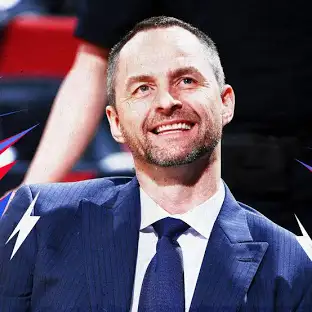
Zach LaVine has been one of the Chicago Bulls’ cornerstone players since arriving via trade from the Minnesota Timberwolves in 2017. Known for his high-flying athleticism, three-point shooting, and scoring prowess, LaVine has twice been named an NBA All-Star (2021 and 2022). His ability to score in a variety of ways makes him one of the premier offensive players in the league, but the question surrounding his future in Chicago centers on his fit with the team’s trajectory and his trade market value.
After signing a five-year, $215 million max contract in 2022, LaVine became one of the highest-paid players in the NBA. While he remains an elite scorer, there are factors complicating his tradability
LaVine’s contract is substantial, with an annual average salary of around $43 million through the 2026-2027 season. This type of contract can make it challenging for teams to absorb his salary without significant cap space or matching contracts in return. In today’s NBA, where financial flexibility is critical, teams may be hesitant to take on such a large deal unless they believe LaVine can be the missing piece to elevate them into contention.
LaVine has dealt with injuries throughout his career, most notably a torn ACL in 2017. While he has largely recovered and maintained his high level of play, teams may be wary of investing in a player with a history of knee issues, especially one under a max contract. Even minor injuries could raise concerns for teams looking to invest long-term.
Though LaVine is an elite scorer, his defense has long been a point of critique. In an era where two-way players are highly valued, some teams might hesitate to trade significant assets for a player whose defensive impact can be inconsistent. While he’s improved in some areas, LaVine’s lack of elite defensive versatility could make him a less attractive target for teams prioritizing defense.
LaVine’s skill set is desirable, but he’s best suited to a team looking for a primary or secondary scoring option. Not every team has that need or the complementary pieces to make a LaVine trade work. Additionally, in a league where superstars like Damian Lillard and James Harden are demanding trades, LaVine might fall lower on the priority list for teams looking to acquire top-tier talent.If LaVine becomes available, a few teams could be interested based on their roster needs and cap flexibility:
Pairing LaVine with Luka Dončić and Kyrie Irving could create one of the most potent offensive backcourts in the league. However, Dallas would need to assess if it’s worth sacrificing long-term flexibility for a win-now move.
The Heat are always on the lookout for stars to complement Jimmy Butler and Bam Adebayo. If they miss out on Lillard, LaVine could become a viable alternative.
Should the Sixers trade James Harden, LaVine might be a strong candidate to fill the scoring void. His shooting could mesh well with Joel Embiid, although salary cap logistics would be a hurdle.
Ultimately, while LaVine’s contract and defensive limitations may make him a tricky trade asset, he remains an elite talent who could draw significant interest in the right situation.
Artūras Karnišovas, hired in 2020 to lead the Bulls’ front office, initially brought hope to a franchise looking to return to relevance. His moves—trading for All-Star center Nikola Vučević, signing DeMar DeRozan, and acquiring Lonzo Ball—were intended to push the Bulls into playoff contention. While the team showed promise in the 2021-2022 season, they have since stagnated, largely due to injuries, chemistry issues, and underwhelming results in the postseason.
The most glaring issue has been Lonzo Ball’s injury troubles, which have sidelined him indefinitely. Ball was supposed to be the glue that held the Bulls together, providing defense, playmaking, and three-point shooting. Without him, the team has struggled to find a rhythm, and Karnišovas’ inability to address this has frustrated fans. Relying on DeRozan and Vučević in a guard-heavy league hasn’t yielded consistent results, either.
While Karnišovas made splashy moves to bring in veterans, the Bulls’ lack of depth has been exposed in the regular season. Additionally, young players like Coby White and Patrick Williams haven’t developed into consistent contributors as hoped. If the front office cannot develop talent or build a strong supporting cast, the team’s ceiling remains low.
Despite the warning signs, Karnišovas has yet to fully commit to a new direction. The Bulls are currently stuck in NBA purgatory—too good to rebuild, but not good enough to contend. The decision not to make major changes this offseason has raised questions about Karnišovas’ long-term vision. If the Bulls continue to underperform, ownership might pressure him to either blow up the roster or make bold moves to get back on track.
When Karnišovas was hired, the expectation was that he would transform the Bulls into perennial playoff contenders. After four seasons, the team has made the playoffs once (2022), and even then, they were knocked out in the first round. In today’s NBA, patience is short, and front-office executives are judged not just by their moves but by results. If the Bulls fail to make significant progress this season, Karnišovas may be the one to pay the price.
Karnišovas is likely facing a make-or-break season. If the Bulls fail to show significant improvement, either through a trade or a cohesive run in the playoffs, ownership might decide to move in a new direction. The pressure is on to not only build around LaVine, DeRozan, and Vučević or decide to pivot into a rebuild.
The coming months will be crucial in determining whether Karnišovas has the ability to steer the Bulls back into contention or whether the front office will need a shake-up to revitalize the franchise.
Leave a Reply